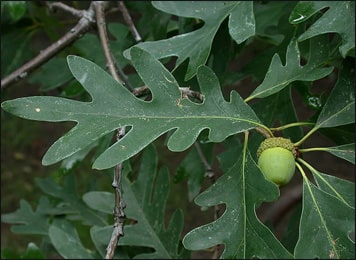
Overview
White oak is one of the hardwoods. It is a large deciduous Missouri native tree which usually occurs in dry upland and ledges as well as lowland valleys and ravines throughout the state. This tree grows up to 50-80 m tall if cultivated and up to 100 m high if grows in the wild. In shape, it is pyramidal when young and when matures turns into a substantial tree with wide-spreading, rounded crown. It has flowers which are yellowish-green in color and appear in spring shortly after the leaves emerge. As white oak ages, the bark becomes shaggy along the middle and upper stem.
What is its Botanical Name?
Quercus alba
To which Family does it Belong to?
Fagaceae
Which is the best site for the Cultivation of the White Oak Tree?
This tree is best grown in rich, acidic, moist, well-drained loams. It has tolerance for dry, rocky soil and drought. It can adapt to a various variety of soil conditions.
What are the Chemical Constituents of a White Oak Tree?
It consists of Grandinin, gallic acid, valoneic acid dilactone, trigalloyl glucose, ellagic acid, phenolic compounds, and quercitrin.
What are the Medicinal uses of White Oak Bark?
- The inner bark of White oak is most commonly used for medicinal purpose.
- It has an astringent effect.
- The diluted extract of this herb can be used for gargles which relieve a putrid sore throat, aphthous sores, and diphtheria.
- White oak bark is used locally to treat hemorrhages, like in bleeding or spongy gums.
- Piles can be treated by this herb. An equal amount of White oak bark and lobelia seeds should be powdered and applied as an ointment on the bleeding piles which is painful condition.
- Its decoction is used for prolapsus ani, leucorrhea, and flabby ulcers.
- This herb is an effective antiseptic. It prevents the body against various infections.
- A decoction of White oak bark is used to relieve pain and bruises.
- To treat chronic diarrhea and inflammation White oak bark is taken internally.
- It treats effectively passive hemorrhages of lungs, uterus, bowels, especially after typhus.
- This herb treats intermittent fever where the fibers become greatly relaxed.
- White oak bark has strengthening properties. Its bath is quite effective in strengthening skin and also tones flaccid structures of children and adults.
- Powder of White oak bark if applied continuously on scalp prevents hair loss and dandruff. For this powder can be mixed with glycerin and twenty grains of this powder should be applied every four to six hours.
- It should be used in relaxed and languid conditions of the stomach.
- It is used to treat fever. This herb lowers temperature in fever, decreases dryness and weakness due to fever.
- It relieves bronchitis and associated symptoms like difficulty in breathing, chest pain, lassitude etc.
- White oak bark improves digestion and increases appetite.
- This herb is used to treat arthritis. It relieves joint pains, difficulty in moving and other associated symptoms.
- It is also used to treat signs and symptoms of inflammation like pain and swelling of skin, throat, mouth genitals and anal region.
What Should be the Dosage?
- Powder – 3 to 6 gram
- Decoction – 5-10 ml
- Tonic – 5 to 10 ml
What are the Side-Effects of White Oak Bark?
- Avoid using it during pregnancy and breastfeeding or take it with physician’s guidance.
- Patients with cardiovascular diseases should not take White oak bark or its any medicinal preparations.
- In case of skin conditions like eczema or large areas of skin damage. Do not take oak bark baths if suffering from any of these conditions.
- In the case of Hypertonia, i.e. a nerve condition affecting muscles and causing over the tightness of muscles, White oak bark should not be used.
- White oak bark may make kidney ailments worse, so it should be avoided in any of the kidney disease patients.
- Liver problems may worsen by taking white oak bark.
